
Way Out West is a 1937 Laurel and Hardy comedy film directed by James W. Horne, produced by Stan Laurel, and distributed by Metro-Goldwyn-Mayer. It was the second picture for which Stan Laurel was credited as producer.
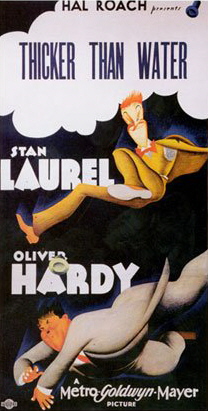
Thicker than Water is a short film starring Laurel and Hardy, directed by James W. Horne, produced by Hal Roach, and released in 1935 by Metro-Goldwyn-Mayer. The short also features James Finlayson and Daphne Pollard in supporting roles. It was the last two-reel comedy starring the comedy team, as Hal Roach decided to end Laurel and Hardy short films and move them solely into feature films.
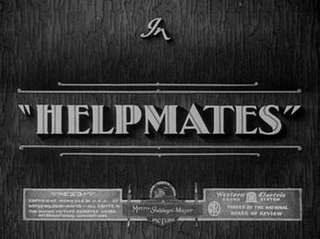
Helpmates is a Laurel and Hardy Pre-Code short film comedy. It was directed by James Parrott, produced by Hal Roach and released by Metro-Goldwyn Mayer on January 23, 1932.

Unaccustomed As We Are is the first sound film comedy starring Stan Laurel and Oliver Hardy, released on May 4, 1929.

The Battle of the Century is a 1927 American silent short film starring comedy double act Laurel and Hardy, who appeared in 107 films between 1921 and 1951. The film entered the public domain in the United States in 2023.

Our Relations is a 1936 American comedy film directed by Harry Lachman starring Laurel and Hardy, produced by Stan Laurel for Hal Roach Studios.
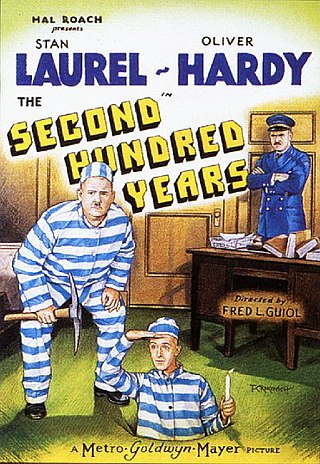
The Second Hundred Years is a 1927 American silent comedy short film starring Stan Laurel and Oliver Hardy prior to their official billing as the duo Laurel and Hardy. The team appeared in a total of 107 films between 1921 and 1951.

They Go Boom is a 1929 short comedy film directed by James Parrott and starring Laurel and Hardy.

Leave 'Em Laughing is a 1928 two-reel silent film starring Stan Laurel and Oliver Hardy. Produced by the Hal Roach Studios, it was shot in October 1927 and released January 28, 1928 by Metro-Goldwyn-Mayer.

Jitterbugs is a 1943 Laurel and Hardy feature film produced by Sol M. Wurtzel and directed by Mal St.Clair.

Busy Bodies is a 1933 short comedy film starring Laurel and Hardy.
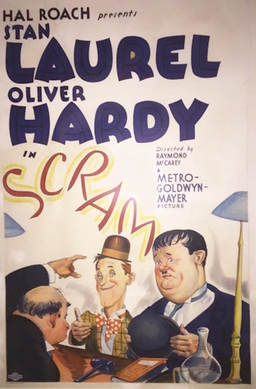
Scram! is a 1932 pre-Code Laurel and Hardy film produced by Hal Roach, directed by Ray McCarey, and distributed by Metro-Goldwyn-Mayer.
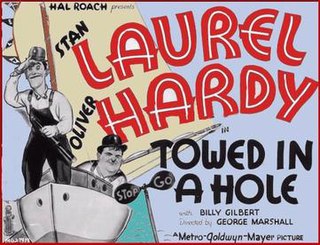
Towed in a Hole is a 1932 pre-Code comedy film starring Laurel and Hardy. The "two-reeler" short was produced by Hal Roach, directed by George Marshall, and distributed by Metro-Goldwyn-Mayer.

Blotto is a 1930 American pre-Code comedy film directed by James Parrott and starring Stan Laurel and Oliver Hardy. The short was produced by Hal Roach and originally distributed by Metro-Goldwyn-Mayer.
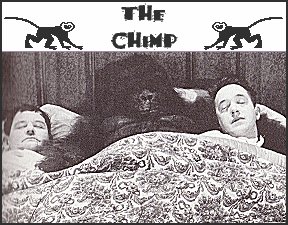
The Chimp is a Laurel and Hardy short film made in 1932. It was directed by James Parrott, produced by Hal Roach, and distributed by Metro-Goldwyn-Mayer. The second half of the film is a reworking from their last silent film Angora Love (1929), itself reworked into a short film the previous year, Laughing Gravy (1931).
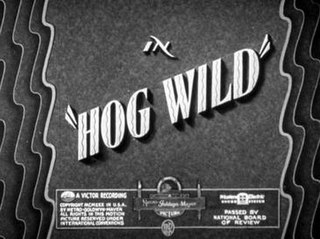
Hog Wild is a 1930 American pre-Code Laurel and Hardy film, directed by James Parrott.

Any Old Port! is an American 1932 pre-Code comedy short film directed by James W. Horne and starring Laurel and Hardy. It was produced by Hal Roach.

Oliver The Eighth is a 1934 American pre-Code comedy horror short film, starring Laurel and Hardy. It was directed by Lloyd French, produced by Hal Roach and distributed by MGM.

County Hospital is a Laurel and Hardy short film made in 1932. It was directed by James Parrott, produced by Hal Roach and distributed by Metro-Goldwyn-Mayer. Ollie is in hospital with a broken leg, Stan comes to visit and ends up getting Ollie kicked out; on the way home Stan crashes the car.

Stan & Ollie is a 2018 biographical comedy-drama film directed by Jon S. Baird. The script, written by Jeff Pope, was inspired by Laurel and Hardy: The British Tours by A.J. Marriot which chronicled the later years of the comedy double act Laurel and Hardy; the film stars Steve Coogan and John C. Reilly as Stan Laurel and Oliver Hardy. The film focuses on details of the comedy duo's personal relationship while relating how they embarked on a gruelling music hall tour of the United Kingdom and Ireland during 1953 and struggled to get another film made.




















